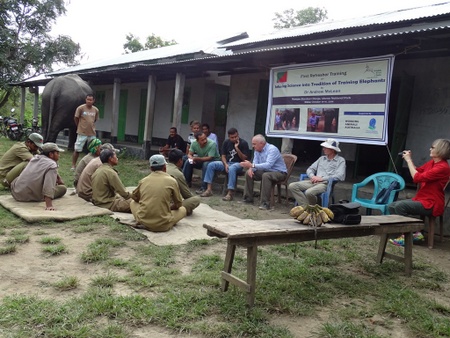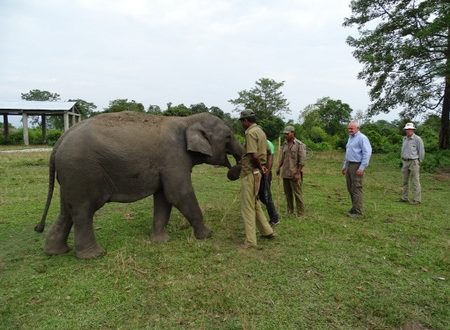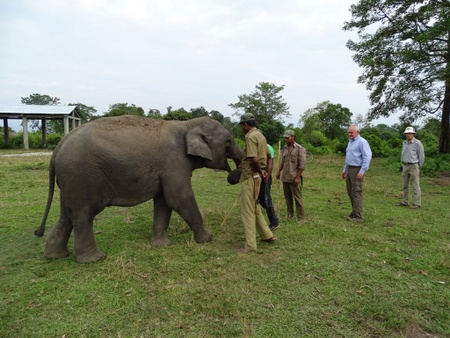Humane captive elephant training workshop unfolds in Assam
Manas, October 27, 2014: Following the refresher workshop in Kerala on alternate humane techniques on training captive elephants, a similar four-day refresher workshop organised by Wildlife Trust of India (WTI) with one of the world’s foremost equine behavioural practitioners Dr Andrew Mclean, in Manas National Park, Assam received very good response from the Forest Department and the mahouts.
Supported by Working for Animals Inc., this refresher workshop held at the Bansbari Range in Manas NP saw the participation of two four-year-old captive born calves, named ‘Rabiprasad’ and ‘Dada’. The latter could be mounted on the third day of training without any restrain or painful procedure.
Assam has roughly 1500 captive elephants of which nearly 200 are with the forest department and rest are privately owned.
In this fourth in the series of workshops held in Kerala and Assam, Dr McLean stressed on the importance of training captive elephant calves in a humane manner without the use of force and coercion. According to Dr McLean, trust and mutual affection should be the base of a relationship between the animal and its trainer. He also shared his techniques of using pressure points to subdue and train elephants and discouraged the use of traditional sharpened spikes.
Winner of the Eureka Prize for Science, Dr McLean emphasised on positive reinforcement for every correct response. According to him, release of pressure points, verbal praise and feeding the animal usually do the trick in training the elephants. “This technique gives far better results than negative reinforcement which usually involves using fear to subdue the animal,” he added.
Dr Prabhat Basumatary, Forest Veterinary Officer, has been attending the training since 2011 and he was in “all praise” of this humane procedure of training captive born calves. He opined this to be adopted as the method of training captive born calves from now on.

The mahouts interacting with Dr Andrew McLean in the Bansbari Range of Manas NP.
Photo: Dr Bhaskar Choudhury/IFAW-WTI
Deputy Field Director, Manas, Sonali Ghosh, a PhD on wildlife Management, had a very long interaction with the trainers and trainees. She welcomed the method and considered this to be the best managed practice for training elephants.
Thereafter, the training was followed with a Health Camp organised by the State Forest Department and WTI. “The health camp for captive elephants at Bansbari on October 16 was attended by all 38 elephants of Manas. Guests were amazed to see the health and well being of the captive elephants at Manas,” said Dr Bhaskar Choudhary, Regional Head, Assam (WTI). The workshop received positive feedback from the Range Forest Officer, Deputy Director of Manas and six mahouts who actively participated in the event.
Earlier this month, Dr Andrew McLean’s book ‘Hasthisiksha – a manual on humane training of elephants calves destined for permanent captivity’, which has been produced in collaboration with Wildlife Trust of India was released in Thiruvananthapuram, Kerala.
For more details on the release of the manual click here.










